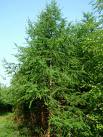Common Larch Tree Information
Images of Common Larch:






Common Larch grows in the following 7 states and provinces:
Connecticut, Maine, Michigan, New Hampshire, New York, Rhode Island, VermontInformation about Common Larch:
The Larix Decidua is commonly known as the Common Larch as well as European Larch.
The currently accepted scientific name for European larch is Larix decidua Mill. (Pinaceae) . There are four or five geographic races, sometimes given status as subspecies or varieties (Alpen , Sudeten, Tatra, Polen , Rumanian) : L. d. var. decidua L. d. var. pendula Henk and Hochst. L. d. var. polonica Raciborski L. d. var. sudetica L. d. var. tatrensis European larch hybridizes with Japanese larch (L. leptolepis) when they are planted together (they are not sympatric). The hybrid, L. xeurolepis A. Henry, is called the Dunkeld larch .The native range of European larch is separated into four distinct, closed regions plus several outliers centered in the Alps. It extends from Switzerland south to Italy . European larch been widely planted throughout Europe and Great Britain, and has also been planted in southern Canada and the northeastern United States. It has become naturalized in Maine, Michigan, New York, Connecticut, New Hampshire, Vermont, and Rhode Island .European larch is a subalpine or montane species, occurring in the Alps with Swiss stone pine (Pinus cembra) and mountain pine (P. montana). It sometimes occurs naturally in pure stands . At middle elevations its associates include Norway spruce (Picea abies) and European silver fir (Abies alba), and at the lowest elevations it may be found with European beech (Fagus sylvatica) .Some of the information provided here is attributed to:Sullivan, Janet. 1994. Larix decidua. In: Fire Effects Information System, [Online]. U.S. Department of Agriculture, Forest Service, Rocky Mountain Research Station, Fire Sciences Laboratory (Producer). , available at the USDA Fire Effects Information System (FEIS) website